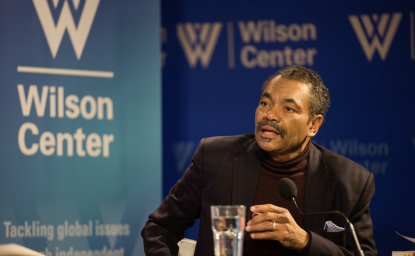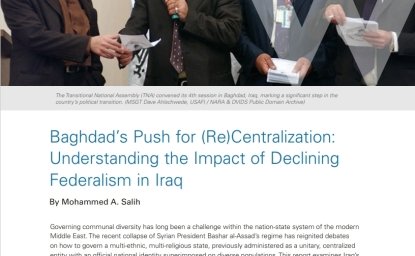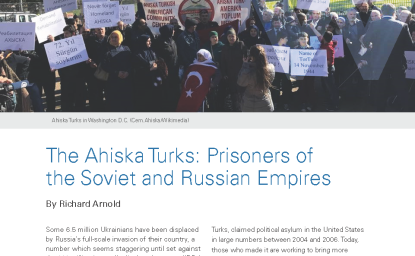301. Economic Reform and Ethnic Cooperation in Post-Soviet Latvia and Ukraine

Stephen Bloom is a postdoctoral Faculty Fellow at the University of California-Los Angeles Department of Political Science and a recent EES Research Scholar. He spoke at an EES noon discussion on September 15, 2004. This is a summary of his presentation. Meeting Report 301.
With the fall of communist regimes across Eastern Europe in 1989 and the subsequent breakup of the multiethnic Soviet, Yugoslav and Czechoslovak states, many scholars and journalists warned of the imminent danger of ethnic conflict throughout the region. Yet if the bloody dismemberment of Yugoslavia realized most of these dire forecasts, the dissolution of the Soviet Union resulted in surprisingly little ethnic conflict, outside Central Asia and the Caucasus. The large-scale ethnic mobilization that accelerated in Soviet republics under Gorbachev seemed to lose steam after the collapse of the Soviet Union. Recent ethnic demobilization in the former Soviet Union presents a puzzle for scholars of nationalism and comparative politics, since the conditions for ethnic conflict cited by area specialists have only worsened over time.
The breakup of the Soviet Union created at least two preconditions that are widely believed to lead to ethnic conflict. First, the post-1989 borders left significant ethnic minority populations within the newly-independent nation states. Moreover, the policies enacted by the Soviet successor states resulted in a dramatic reversal of status for the new Russian-speaking minority. Language laws were passed, Russian schools were closed and, in the case of Estonia and Latvia, Soviet-era immigrants were disenfranchised. Taken together, these measures could have been expected to elicit resentment and provoke mobilization. As Donald Horowitz notes, formerly dominant ethnic groups have fought changes to the ethnic status hierarchy brought about by the creation of new states or by electoral outcomes that placed them under "alien rule."
Second, ethnic demobilization coincided with the introduction of major economic reforms that led to a severe decline in the living standards of the population. Economic reform resulted in the closing of Soviet economic giants, some of which employed over 10,000 workers, and the opening up of local markets to more competitive Western products. The potential for ethnic conflict as a result of economic reform was not lost on observers of post-Soviet Latvia and Ukraine. For example, unemployment that would come with the dissolution of factories was expected to affect ethnic Russians at a higher rate, due to the overrepresentation of Russians among industrial workers.
Hints of a possible solution to this puzzle of ethnic cooperation in the former Soviet Union came to light in a series of informal interviews I conducted in Latvia and Western Ukraine in 1997 and 1998. I asked respondents why, unlike in the former Yugoslavia, ethnic conflict had not erupted in post-Soviet Latvia or Ukraine. A frequent response to this question was that everyone, irrespective of ethnicity, was living badly. That economic hard times could foster ethnic cooperation seemed absurd to me at first—there had to be other forces at work. However, I heard the same explanation over and over during subsequent interviews and focus group discussions that I conducted in Latvia and Ukraine and I resolved to pursue this idea more thoroughly.
Economic reform and ethnic cooperation
I argue that economic reform encouraged ethnic cooperation rather than conflict between ethnic Russians and the titular nationalities (e.g., Latvians in Latvia) by removing the economic differentiation of ethnic groups cultivated during the Soviet period. Soviet ethnic politics, like much of Soviet politics, were zero-sum. In the Soviet shortage economy, the allocation of goods by the state was believed to benefit some ethnic groups at the expense of others. Post-Soviet economic liberalization in Latvia and Ukraine helped to level these ethnic-economic hierarchies, thus uncoupling ethnic concerns from economic problems. The negative consequences of economic reform, unlike the failings of the Soviet shortage economy, are not readily ethnicized.
I highlight two significant changes brought about by economic reform and show how these changes represent an improvement over the Soviet status quo. First, the Soviet state awarded private goods. That is, those who had a certain status (from an occupation or belonging to a particular ethnic group) were favored with scarce goods—from cooking oil to jobs and even apartments. In contrast, the postcommunist state offers public bads: unlike the prized goods of the Soviet shortage economy, the costs of economic reform (public bads) are perceived as affecting everyone equally.
The second and related change is from the group-oriented Soviet state to a capital-oriented market. Whereas the Soviet state favored certain groups with goods and services, today's capital-oriented market makes a wide selection of goods and services available to any individual who has money.
From private goods to public bads
A fundamental tension existed between the Soviet regime's ideological concern for equality and the Soviet state's actual allocation of goods, in which readier access to goods was granted to those who either worked in certain sectors of the economy or held group-based entitlements. Questions of social mobility in the Soviet period—from how to get a job to how to secure housing, to how to obtain a higher education—were linked (or perceived to be linked) to ethnic group membership. The economic problems of the shortage economy further exacerbated ethnic grievances. The shortage economy, as Janos Kornai describes in his classic analysis, was a "sellers' market" and inherently competitive. Individual buyers competed to capture any goods made available by the state.
If the Soviet state awarded private goods, the postcommunist state offers only public bads: the state can no longer be relied upon to provide goods and services. Unlike the economic problems of the late Soviet period, the problems of the current economic transition are seen as affecting everyone equally, irrespective of ethnicity. The political mobilization that has occurred in response to economic reform has largely taken economic rather than ethnic forms. The high cost of utilities and frequent bank failures have become a platform on which Latvians and ethnic Russians can jointly mobilize. In fact, focus group participants in both Riga and L'viv personally attributed the improvement in ethnic relations to the economic crisis. The responses of focus groups in L'viv (see text box to the right) provide perhaps the best insight into how economic problems, which had been highly ethnicized in the Soviet period, are now seen as the cause of ethnic peace.
From group-oriented state to capital-oriented market
Of course, everyone is not living badly. As in most postcommunist states, a small minority in Latvia and Ukraine live quite well. Differences in socio-economic status today are glaring, especially when compared to the minor differences that existed under state socialism. The fact that today's dramatic economic differences are not readily framed in ethnic terms is interesting. While declaring the universal equality of all, the Soviet regime provided (or was perceived to provide) varying economic outcomes to different groups. These differences were readily coded in ethnic terms in settings where there were significant differences (or perceived differences) in economic status across ethnic groups. Markets, including the nonrules-based ones present today in Latvia and Ukraine, have a different selection mechanism. Joseph Schumpeter referred to this as "creative destruction"—the market's propensity to select individual winners and losers.
The Soviet state, on the one hand, targeted certain individuals with group-based perks to buy their loyalty or to increase their productivity. As I have argued, the differential economic outcomes that resulted from these policies were readily framed in ethnic terms in many Soviet republics. In such cases, questions of social mobility were linked (or perceived as linked) to ethnic group membership. Today's capital-oriented market, on the other hand, provides access to goods and services to anyone who has money. Individuals with money, irrespective of ethnicity, can buy new housing, imported cars and a prestigious education for their children. Individuals without money, irrespective of ethnicity, will be denied access to these and other goods and services.
The transition from group-oriented state to capital-oriented market can be seen in the different potential responses that the following question would have elicited in the Soviet period and in the postreform period: "How did your neighbor get that caviar?" The answer in Soviet times may have been: "Because she is Russian," since group membership was thought to facilitate access to scarce goods. Today the answer would more likely be: "Because she has money." Because market success and failure do not map onto ethnicity in post-Soviet Latvia and Ukraine, this and other privations are less likely to be ethnicized today, as the holders of capital are viewed in individual as opposed to group terms.
Market-based incentives have also led to the cooperation, however instrumental, of ethnically different individuals. Russian speakers in focus groups in Riga and L'viv noted more acceptance of speaking Russian in stores today than in the Soviet past. Soviet salesclerks had few incentives to sell their products, in fact, the fewer they sold, the more they could take home to their families. Therefore, unless they had Russian supervisors, Soviet salespeople did not need to speak Russian. In Latvia and Western Ukraine today, many goods are chasing few customers, thus entrepreneurs will sell their goods in any language.
Market transactions and social encounters provide avenues for Russian language maintenance in both Latvia and Ukraine. This fact has not been lost on nationalists, who may have believed that the defeat of the Soviet system was required for the survival of the titular languages. Ivan Dziuba, a prominent Ukrainian dissident, noted in 1998 in a new introduction to his famous samizdat critique of Soviet nationalities policy "Internatsionalizm chy rusyfikatsiia?" (Internationalism or Russification?) that business in contemporary Ukraine "speaks Russian." However, the fact that "business speaks Russian," does not seem to have inspired grassroots support for titular language revival among ordinary members of the titular nationality. Had he known that the Ukrainian language would not be protected within a post-Soviet Ukrainian nation state, he might have thought twice about risking his life for Ukrainian independence.
Some may object to a discussion of market incentives when no market of the Western sort exists in Latvia, let alone Ukraine. In its place is an economy where personal connections and patron-client networks dominate. It could be further argued that the titular nationalities should benefit more from the current partially-reformed market, at least in Latvia, due to titular dominance of the bureaucracy. While corruption and informal connections continue to plague the transitional economies of Latvia and Ukraine, their importance has altered in one crucial respect—informal networks have become monetized. The monetization of informal networks has important and interesting consequences for ethnic cooperation. If some analysts worried that the introduction of language exams for university admissions would penalize ethnic Russian applicants in Latvia and Ukraine, they overlooked the fact that ethnic Russians, like Latvians and Ukrainians, can pay bribes.
Conclusion
My research challenges the conventional wisdom that in multiethnic states economic reform generally exacerbates ethnic conflict. In a study of postcommunist Latvia and Ukraine, I find that as major economic reforms were introduced and living standards fell dramatically, ethnic mobilization decreased. I explain this paradoxical outcome by showing how economic reforms implemented in Latvia and Ukraine broke down ethnic-economic hierarchies that had generated ethnic resentment in the Soviet period. By the mid-1990s, Latvians and Russians were not on opposite sides of barricades, but marching in the same rallies, with signs in both languages denouncing government economic policies.
FOCUS GROUP QUESTIONS & ANSWERS
Do you agree with the statement that ethnic relations are calmer today than they were 10 years ago? If so, why is this the case?
— I think that each person has so many problems today that nationality is not an important issue for anyone.
— Today, there are a lot of other economic problems, and for that reason nationality issues are becoming secondary.
— Today, there is a struggle for survival. Each person is worried about his or her family, about the future of his or her children. Nationality questions became secondary.
— Today, there is one problem: how to survive in this country and what will be next?
— It [the nationality question] is no longer timely. If previously Ukrainians blamed Russians for their problems, it has already been 10 years and nothing good has occurred in the economy or in politics. People figured out that Russians are not to blame.
— Ukraine became independent and here, in L'viv, the fight for the "pure" nation took place. They made noise, made noise and figured out that Russians were not to blame for the fact that Ukrainians live badly. Here in L'viv Ukrainians govern and the people live badly. It is not dependent on nationality, but on a number of other factors. People figured this out and things calmed down. We all live in poverty, whether Russians or Ukrainians.
Author
PhD Candidate, Department of Political Science, University of California, Los Angeles

Global Europe Program
The Global Europe Program is focused on Europe’s capabilities, and how it engages on critical global issues. We investigate European approaches to critical global issues. We examine Europe’s relations with Russia and Eurasia, China and the Indo-Pacific, the Middle East and Africa. Our initiatives include “Ukraine in Europe”—an examination of what it will take to make Ukraine’s European future a reality. But we also examine the role of NATO, the European Union and the OSCE, Europe’s energy security, transatlantic trade disputes, and challenges to democracy. The Global Europe Program’s staff, scholars-in-residence, and Global Fellows participate in seminars, policy study groups, and international conferences to provide analytical recommendations to policy makers and the media. Read more

Explore More
Browse Insights & Analysis
Dr. Maurice Jackson: The Sounds of Resistance Throughout History


